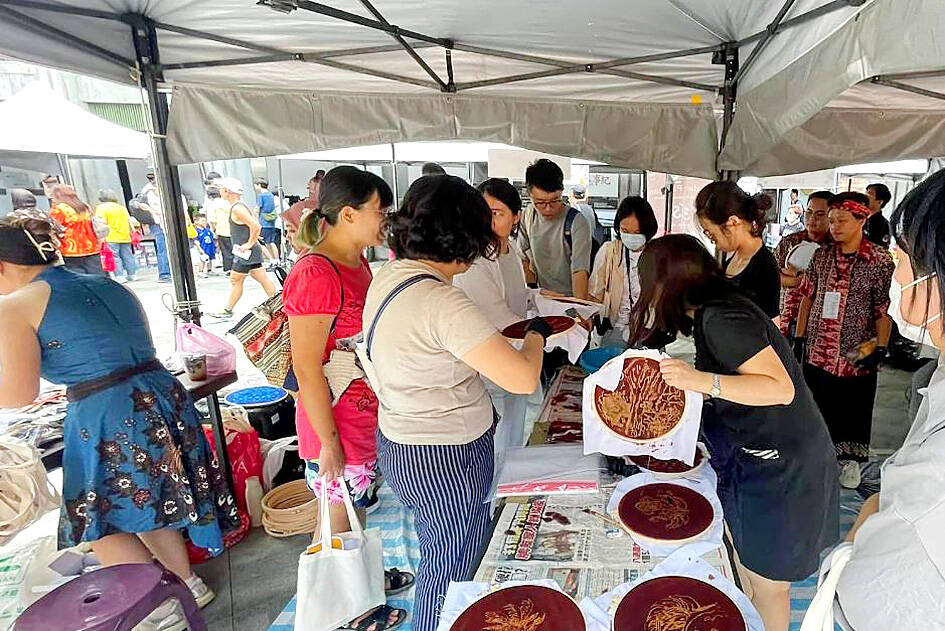The National Taiwan Museum in Taipei buzzed with traditional Indonesian music yesterday as it staged batik and songket festivals, events dedicated to celebrating and promoting artistic traditions from the Southeast Asian country.
People queued up to buy Indonesian food such as chicken satay and spicy rendang, while a runway show was held at the event by the Indonesian Diaspora Network in Taiwan (IDN), with Indonesian migrant workers showcasing costumes made using the batik and songket techniques.
Batik is a wax resist dyeing technique applied to a whole piece of cloth, while songket describes the weaving technique that artisans employ to produce patterns from silk or cotton that frequently incorporate gold or silver threads, the IDN said.

Photo: Screen grab from the museum’s Facebook page
A batik do-it-yourself session was also held at the museum to give participants insights into the culture and shed light on contemporary Indonesian art forms.
CULTURAL HERITAGE
Batik is recognized by UNESCO as a crucial part of Indonesian heritage, batik artist Saian Nur Fajri said. “It is the technique, the oral tradition which is passed down from grandparents to grandchildren.”
Compared with batik from other countries such as Malaysia or even nations in Africa, Indonesian batik possesses a deeper sense of uniqueness and cultural value.
Batik can be observed everywhere in Indonesian life — from baby carriers that keep little ones safe to featuring at funerals, Saian said.
Indonesians wear batik as an everyday outfit for work or school, but also on formal occasions, he said, adding that different patterns and colors are popular in different areas of the country.
Adzriel Rafaizan, a volunteer assisting a batik vendor, said that costumes utilizing the songket technique are typically worn on formal occasions.
He added that these costumes tend to be more fragile due to the intricate patterns created, which make them delicate.
Since 2017, the IDN has been collaborating with the National Taiwan Museum to host the batik art festival annually, whereas the songket festival is making its debut this year.
Taiwan’s Ministry of Labor reported that as of June about 260,000 Indonesian migrant workers were employed in Taiwan, about 35 percent of migrant workers in the country.

Alain Robert, known as the "French Spider-Man," praised Alex Honnold as exceptionally well-prepared after the US climber completed a free solo ascent of Taipei 101 yesterday. Robert said Honnold's ascent of the 508m-tall skyscraper in just more than one-and-a-half hours without using safety ropes or equipment was a remarkable achievement. "This is my life," he said in an interview conducted in French, adding that he liked the feeling of being "on the edge of danger." The 63-year-old Frenchman climbed Taipei 101 using ropes in December 2004, taking about four hours to reach the top. On a one-to-10 scale of difficulty, Robert said Taipei 101

Nipah virus infection is to be officially listed as a category 5 notifiable infectious disease in Taiwan in March, while clinical treatment guidelines are being formulated, the Centers for Disease Control (CDC) said yesterday. With Nipah infections being reported in other countries and considering its relatively high fatality rate, the centers on Jan. 16 announced that it would be listed as a notifiable infectious disease to bolster the nation’s systematic early warning system and increase public awareness, the CDC said. Bangladesh reported four fatal cases last year in separate districts, with three linked to raw date palm sap consumption, CDC Epidemic Intelligence

Taiwanese and US defense groups are collaborating to introduce deployable, semi-autonomous manufacturing systems for drones and components in a boost to the nation’s supply chain resilience. Taiwan’s G-Tech Optroelectronics Corp subsidiary GTOC and the US’ Aerkomm Inc on Friday announced an agreement with fellow US-based Firestorm Lab to adopt the latter’s xCell, a technology featuring 3D printers fitted in 6.1m container units. The systems enable aerial platforms and parts to be produced in high volumes from dispersed nodes capable of rapid redeployment, to minimize the risk of enemy strikes and to meet field requirements, they said. Firestorm chief technology officer Ian Muceus said

MORE FALL: An investigation into one of Xi’s key cronies, part of a broader ‘anti-corruption’ drive, indicates that he might have a deep distrust in the military, an expert said China’s latest military purge underscores systemic risks in its shift from collective leadership to sole rule under Chinese President Xi Jinping (習近平), and could disrupt its chain of command and military capabilities, a national security official said yesterday. If decisionmaking within the Chinese Communist Party has become “irrational” under one-man rule, the Taiwan Strait and the regional situation must be approached with extreme caution, given unforeseen risks, they added. The anonymous official made the remarks as China’s Central Military Commission Vice Chairman Zhang Youxia (張又俠) and Joint Staff Department Chief of Staff Liu Zhenli (劉振立) were reportedly being investigated for suspected “serious